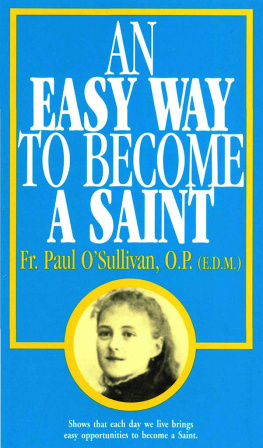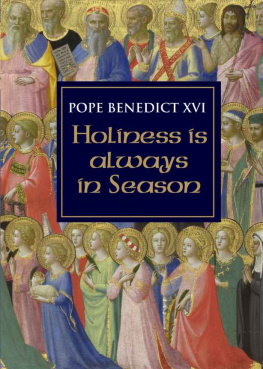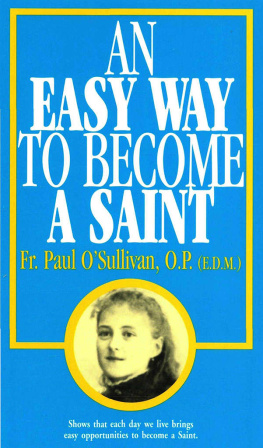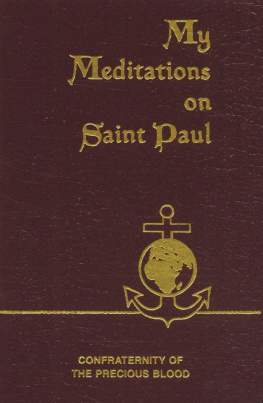AN EASY WAY
TO BECOME
A SAINT
Fr. Paul O'Sullivan, O.P.
CUM PERMISSU SUPERIORUM.
WITH ECCLESIASTICAL APPROBATION
June 13, 1949.
All rights reserved. First published around 1949 by Edies do Corpo Santo, Lisbon, Portugal.
Typography is the property of TAN Books and Publishers, Inc., and may not be reproduced, in whole or in part, without written permission from the publisher.
Library of Congress Catalog Card No.: 90-70237
TAN BOOKS
Charlotte, North Carolina
1990

St. Therese the Little Flower at age 13.
Many think that it is practically impossible to be a saint
or at least extremely difficult .
In this book we offer our readers
many easy but infallible means
of reaching a high degree of sanctity .
Publisher's Note
An Easy Way to Become a Saint is one of the best-loved books of Fr. Paul O'Sullivan, O.P. All of Fr. O'Sullivan's works, in fact, have been favorites of Catholic readers for many years.
These books used to be published in Portugal, starting in the 1940's, and we found them to be very popular in the 1970's when we were importing them from there. In the meantime, however, the Portuguese publisher has ceased publishing these books, and St. Martin Apostolate in Dublin, a Dominican organization, has been distributing them.
We are very pleased to have been given permission to republish Fr. O'Sullivan's books. They are short, easy to understand and full of beautiful and encouraging stories from our Catholic heritage. They are conceived and written to help us live our Catholic Faith on an everyday basis in a full, rich, rewarding manner, so that we may reap both the happiness and peace in this world and the eternal salvation of our souls in the next that come from doing God's holy will.
Fr. O'Sullivan was obviously convinced that it was not so hard to become a saintif we will only make use of the means Christ has put at our disposal in the Catholic Religionand he has set out to show us the way.
We hope that An Easy Way to Become a Saint will be more popular than ever in this new edition. And we trust that it will help many to realize that holiness is truly within our reach, if we will take advantage of the many rich opportunities to gain graces which God sends us every single day.
The Publishers
May 15, 1990
CONTENTS
Foreword
AN EASY WAY TO BECOME A SAINT
These words will come as a surprise to many readers, but greater will be their surprise on perusing the following pages to see how true the words are.
1. To be a saint is to love God. Now what is easier than to love a God who is infinitely good and who loves us with infinite love?
Our hearts were made expressly to love Him, just as our eyes were made to see, our ears to hear. Surely there can be no difficulty in doing that for which we were expressly made.
2. To be a saint is to do all our actions for love of God. He made us to love and serve Him. He gave us our wonderful faculties to use for our own happiness and benefit, but He asks us to do all we do for love of Him. In return, He will give us a rich reward for our every action. This is what St. Paul tells us to do: "Whatever you do in word or work, do all in the name of the Lord Jesus Christ." ( Col . 3:17).
Thus another infallible and easy way to become a saint is to do all we do for love of God.
3. God has given us a beautiful religion made especially for our poor human hearts, a religion of peace and love, a religion which gives us abundant helps to correct our faults and defects, a religion that gives strength to the weakest and consoles the most broken-hearted. Those who practice this all-wise and consoling religion are truly saints.
The one difficulty in performing these three duties is not so much our weakness as our lamentable ignorance . We do not love God, simply because we do not know Him. We have been living with utterly erroneous ideas about Him. We look on God as a stern God, a God of majesty, whom we reverence, but fear; we only think of Him as a God of justice who punishes our sins. There we stop. That, as such, is a caricature of God, for God above all is a God of sweetness, mercy and love, a God who loves us most tenderly and desires our love in return.
We do not offer our actions for the love of God because we do not realize that our every thought, word and act give God pleasure and obtain for us great merit, if only we do them for love of Him. But because we do not realize this fact, the countless acts of the day, which might so easily bring us immense rewards, are utterly lost.
How imperfectly understood is our glorious Religion!
By many it is looked on as a hard duty that must be performed. They look on the Ten Commandments as restrictions to their liberty, instead of seeing them as they arethe surest guarantees of their happiness.
The treasures of joy and consolation which our Religion offers, the helps and strength it gives are little known. Prayer, instead of being a pleasure, is looked upon as a penance. The Sacraments, which are very rivers of grace, are little appreciated, little used. All this is owing to our ignorance . In a word, what we most need is an intelligent grasp of our divinely beautiful and all-wise Religion, one which will secure for us not only a high degree of holiness but the greatest possible measure of happiness.
The prevailing idea of many is that holiness implies leading a sad and austere life; whereas, true holiness gives us immense joy, consolation and strength.
Many too think that it is practically impossible to be a saint, or at least extremely difficult.
We offer our readers in this booklet many easy but infallible means of reaching a high degree of sanctity.
Chapter 1
TWO KINDS OF SAINTS
There are saints and saints. Some we may call "extraordinary saints" and some "ordinary saints."
Extraordinary saints are raised up by God for some extraordinary mission, and to these God gives extraordinary means to carry out that mission.
Such were, for instance, St. Dominic, St. Francis of Assisi, St. Ignatius Loyola and a host of others.
St. Dominic was raised up by God to defend the Church against the Albigensian heretics, who taught the vilest doctrines and perpetrated the most hideous crimes. Kings sent armies against them, the Pope sent holy men to check them, but all in vain.
God then raised up St. Dominic who, by the holiness of his life and his earnest preaching, converted 100,000 of these hardened sinners in a remarkably short time.
Notwithstanding his austere life and incessant labors, there was no one more joyful, more lovable than St. Dominic. He was sad only when he heard of the sorrows of others or of offenses committed against his dear Lord.
The Saint founded three religious orders, which have given to the Church notable saints, missionaries, martyrs, bishops and popes.
What especially endears him to us is the fact that it was he who gave us the Rosary, which God's Holy Mother had given to him.
Who has not heard of the seraphic St. Francis of Assisi, so famous for his profound humility, his extreme poverty and his burning love of God, as a reward of which he received on his hands and feet and in his side the Sacred Stigmata, the marks of Christ's five wounds.
He, too, founded three religious orders, which have given many and great saints to the Church, people such as St. Bonaventure, St. Anthony of Padua, St. Clare and many others, saints who shine as bright stars in the firmament of Heaven.
St. Ignatius of Loyola is another example of an extraordinary saint. He began life as a soldier in the army of Spain, but God called him to be a great soldier of Holy Church.
Next page






